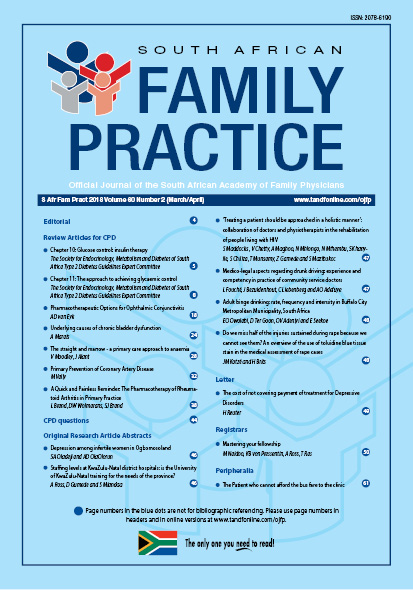Depression among infertile women in Ogbomosoland
Keywords:
depression, infertility, social functioning, mental disorder, co-morbidity
Abstract
Background: Infertility is a major medical condition that affects many married couples globally and it has immense psycho-social impact on couples, especially in Africa where a high premium is placed on child-bearing. This study therefore determined the prevalence of and the factors associated with depression among infertile women in Ogbomoso, Southwest Nigeria. Methods: The study was a descriptive cross-sectional study carried out at the gynaecology clinic of the Bowen University Teaching Hospital using the Patient Health Questionnaire-9 to screen for and determine the severity of depression as well as assess the social functioning of the respondents. A total of 110 women with infertility were recruited. Data was analysed using SPSS® (version 20) with statistical significance set at less than 0.05. Results: The study found a depression prevalence of 52.7%. There was no significant association between the age group of the respondents (p = 0.889), their level of education (p = 0.731), years since marriage (p = 0.38), type of infertility (p = 0.873), number of living children (p = 0.226), sex of the children (p = 0.257) and depression. Depression was, however, significantly associated with impairment in social functioning of the respondents (p = 0.005). Conclusion: Depression is a very common co-morbidity in infertile women. It should not only be screened for among infertile women, but physicians attending to such women need to offer psycho-social support as part of care for these women. (Full text of the research articles are available online at www.medpharm.tandfonline.com/ojfp) S Afr Fam Pract 2018; DOI: 10.1080/20786190.2017.1370840
Section
Research Articles
By submitting manuscripts to SAFP, authors of original articles are assigning copyright to the South African Academy of Family Physicians. Copyright of review articles are assigned to the Publisher, Medpharm Publications (Pty) Ltd, unless otherwise specified. Authors may use their own work after publication without written permission, provided they acknowledge the original source. Individuals and academic institutions may freely copy and distribute articles published in SAFP for educational and research purposes without obtaining permission.

